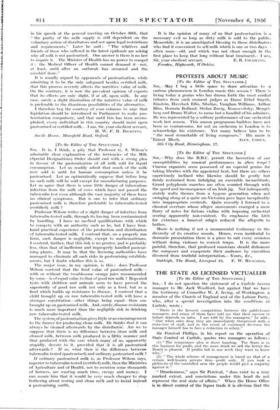THE STATE AS LICENSED VICTUALLER
[To the Editor of THE SPECTATOR.] SIR, —I do not question the statement of a Carlisle tavern manager to Mr. Jack Woolford, but against that we have the testimony of Councillor W. J. Irving, of Workington, a member of the Church of England and of the Labour Party, who, after a special investigation into the conditions at Carlisle, wrote : " There is the keenest competition between the publicliouse managers, and many of them have. told me that their success or failure depends on sales. I ani told 'by the managers," he adds, "that when sales drop they are immediately threatened with a red, uction of staff, and in the event _of continued decrease the manager himself has to face a reduction in salary."
. Sir Percival Phillips, in his .report on the operation. of State .Control at Carlisle, quotes two managers as _ follows : (1) " The temperance plea, is sheer humbug. The State_sis in this business for profit, and the more drink we sell the better the Board is pleased. If profits fall in one week they want to know why."
(2) " The whole -scheme of management is based on that of a certain well-known private firm—profit only. If you took a plebiscite of the 'controlled area the people would give a majority against it."
• -" Drunkenness," says Sir Percival, " does exist to a very Marked extent, and convictions under this head do not represent the real-state of affairs." When the Home Office is in- direct- control-of the liquor trade it is obvious that the impartial attitude, which is a marked characteristic of the police force generally, in whatever direction their duties lie, is difficult to maintain. Mr. Filson Young wrote after his visit to Carlisle : " I could not help noticing that the police seemed studiously unobservant of drunkenness per se."—















































 Previous page
Previous page